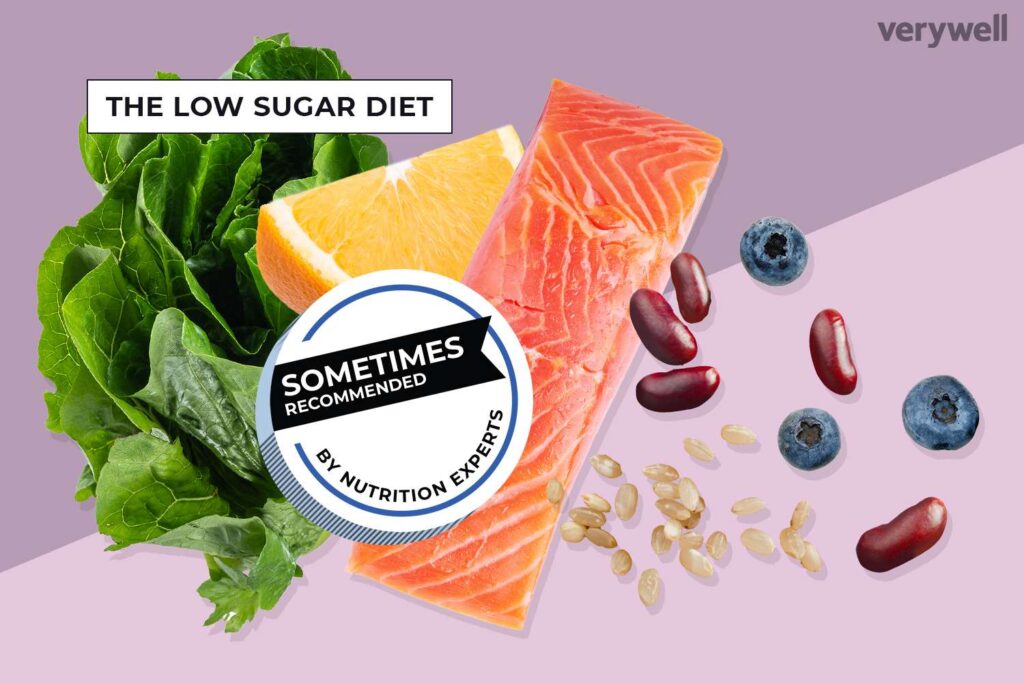Introduction to Low-Sugar Diets.
Venturing into the realm of diets can be daunting, particularly with a never-ending flow of novel fads and knowledge. Among these, low-sugar diets have gained momentum in health spheres as a popular subject. As awareness grows regarding the effects of sugar on our well-being, individuals are eager to delve into the advantages of reducing their intake of sweetness.Studies have shown that consuming too much sugar can result in both weight gain and health problems such as diabetes and heart disease. With a growing interest in finding healthier options, it’s no surprise that low-sugar diets are becoming increasingly popular. For those interested in the impact of sugar on the body or looking for meal plans that support this trend, you are not alone in your pursuit of understanding. Let’s explore the intriguing realm of low-sugar diet and uncover expert opinions on the matter!
The Science Behind Sugar and its Effects on the Body.
The consumption of sugar, especially refined sugars, can initiate a series of responses in the body. These responses cause an increase in blood glucose levels, resulting in the release of insulin from the pancreas. Insulin aids in the absorption of sugar by cells for energy. Repeatedly consuming high amounts of sugar can lead to insulin resistance in the long run. This occurs when cells lose their sensitivity to insulin’s messages, causing a buildup of sugar in the blood.
In addition to contributing to weight gain and increasing the risk of diabetes, excessive sugar intake can also have negative effects on mental well-being. Studies have shown a connection between consuming high levels of sugar and experiencing mood disorders such as anxiety and depression.In addition, processed sugars often do not contain the essential nutrients necessary for our bodies to function at their best. Rather than nourishing us, they can lead to frequent cravings and energy crashes throughout the day. Recognizing these mechanisms sheds light on why numerous individuals are drawn to low-sugar diet trends as a component of their overall wellness journey.
Popular Low-Sugar Diet Trends and How They Work.
Low-sugar diets, renowned for their potential health benefits and weight management, have become increasingly popular. A prime example of this is the Paleo diet, which promotes the consumption of unprocessed and wholesome foods such as meats, fish, fruits, and vegetables while discouraging the use of refined sugars. The Whole30 program has become a rising star due to its 30-day challenge that involves cutting out sugar, grains, and legumes. By doing so, it prompts participants to completely reset their eating habits.

Another noteworthy eating plan is the ketogenic diet. It works by greatly limiting carbohydrate intake and inducing a state of ketosis, which leads to a decrease in sugar consumption without causing feelings of deprivation. Intermittent fasting and low-sugar principles make a great team. By implementing timed eating windows, intermittent fasting can aid in managing blood sugar levels and reduce the temptation of indulging in sugary snacks late at night. Each of these trends offers individual methods, yet all strive towards a shared objective: reducing sugar intake for improved overall well-being and lifestyle enhancements.
The Paleo diet, which has gained remarkable popularity in recent years, promotes improved health and weight loss through low-sugar consumption. This trend is known for its emphasis on whole foods like meats, fish, fruits, and vegetables, while discouraging the consumption of processed sugars.
Benefits of a Low-Sugar Diet for Overall Health.
By incorporating a low-sugar diet into one’s lifestyle, overall health can be greatly improved. This change in sugar consumption may also facilitate more effective weight management, resulting in easier weight loss. By keeping sugar levels in check, energy can remain stable all day. This results in reduced fluctuations, leading to enhanced concentration and efficiency. Limiting sugar intake has been linked to a decreased likelihood of developing chronic conditions such as diabetes and heart disease. Research suggests that excessive consumption of sugar can cause inflammation in the body, increasing the risk of various health problems in the long run.
Adopting a low-sugar lifestyle can also aid in improving digestive health. For most individuals, cutting back on sugary foods has been effective in relieving bloating and discomfort. In addition, choosing lower-sugar options can lead to better skin clarity as it may reduce breakouts and enhance the overall radiance of one’s complexion.
Debunking Misconceptions and Myths About Low-Sugar Diets.
Contrary to popular belief, a low-sugar diet does not equate to cutting out all carbs. In fact, nutritious carbohydrates such as fruits and whole grains can still be incorporated in moderation. There is another popular misconception that eliminating sugar from your diet results in immediate weight loss. Although reducing sugar consumption can contribute to managing weight, it is important to note that lasting changes require dedication and patience.
There is a common belief that low-sugar diets lack flavor. However, this is not the case. In fact, they offer a whole new world of delicious taste experiences through the use of spices and natural sweeteners such as stevia or monk fruit. There is also uncertainty surrounding artificial sweeteners. While some consider them to be healthier substitutes, recent research indicates that moderation is crucial as they may still influence a desire for sugary foods. When it comes to sugar, not all types are equal. The natural sugars found in fruits have a different impact on the body compared to added sugars in processed foods. It is essential to recognize this difference for a successful low-sugar journey.
Tips for Successfully Following a Low-Sugar Diet.
While adhering to a low-sugar diet may pose difficulties, implementing the appropriate tactics can make it more manageable. One helpful approach is carefully examining product labels, as sugar often lurks in unexpected sources. In addition, prioritize whole foods such as fruits, vegetables, and lean proteins as they offer vital nutrients without high amounts of sugar. Utilizing meal prep can also assist in staying on course and avoiding impulsive temptations.
In addition, prioritize whole foods such as fruits, vegetables, and lean proteins as they offer vital nutrients without high amounts of sugar. Utilizing meal prep can also assist in staying on course and avoiding impulsive temptations.Additionally, remember to stay hydrated. Oftentimes, feelings of thirst can be mistaken for a desire for sugary snacks. By drinking an adequate amount of water throughout the day, you can prevent those cravings from taking over. Think about using either an app or journal to track your meals. Doing so not only promotes accountability but also uncovers any repetitive eating patterns that may need to be changed.
Expert Opinions from Nutritionists and Doctors.
The advantages of consuming low-sugar diets have become a frequent topic among nutritionists and doctors. It is widely accepted by professionals that limiting sugar consumption can positively impact one’s health, particularly for those who have difficulty maintaining a healthy weight. According to Dr. Jane Smith, a registered dietitian, reducing added sugars can balance energy levels and prevent the well-known “sugar crash” that often triggers cravings for additional sugary treats. However, Dr. Mark Johnson highlights that not all sugars carry the same nutritional value. He suggests giving preference to naturally occurring sugars in fruits and vegetables and avoiding processed alternatives.
In addition, specialists advise against overly strict limitations. A well-rounded approach is essential; it is important to prioritize unprocessed foods rather than fixating on meticulously tracking sugar intake. According to a majority of healthcare experts, embracing a sustainable low-sugar lifestyle can lead to long-term benefits without the feeling of deprivation or restriction.






